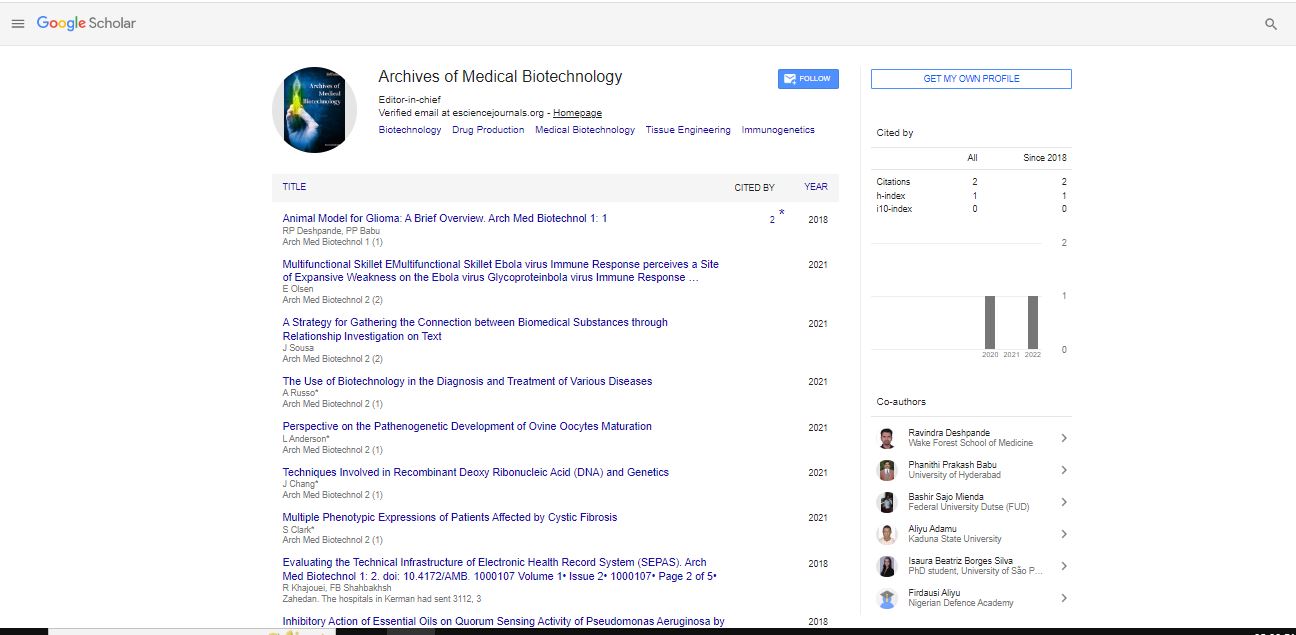Editorial, Arch Med Biotechnol Vol: 6 Issue: 1
Biotechnology in Cancer Diagnostics and Therapy
Swati Joshi*
Department of Oncology and Biotechnology, Tata Memorial Hospital, Mumbai, India
- *Corresponding Author:
- Swati Joshi
Department of Oncology and Biotechnology, Tata Memorial Hospital, Mumbai, India
E-mail: swati.joshi@tmh.in
Received: 01-Mar-2025, Manuscript No. AMB-25-170190; Editor assigned: 4-Mar-2025, Pre-QC No. AMB-25-170190 (PQ); Reviewed: 20-Mar-2025, QC No AMB-25-170190; Revised: 26-Mar- 2025, Manuscript No. AMB-25-170190 (R); Published: 30-Mar-2025, DOI: 10.4172/amb.10000
Citation: Swati Joshi, Department of Oncology and Biotechnology, Tata Memorial Hospital, Mumbai, India. Arch Med Biotechnol 6:1.
Copyright: © 2025 Swati Joshi, this is an open-access article distributed under the terms of the Creative Commons Attribution License, which permits unrestricted use, distribution, and reproduction in any medium, provided the original author and source are credited.
INTRODUCTION
Cancer remains one of the leading causes of morbidity and mortality in India. Medical biotechnology has significantly contributed to cancer diagnostics and treatment, enabling earlier detection and targeted therapies [1].
Diagnostic Innovations
Molecular diagnostics such as PCR, next-generation sequencing (NGS), and liquid biopsies are increasingly used in India for detecting genetic mutations in cancers like breast, lung, and leukemia [2]. Immunohistochemistry and biomarkers further guide treatment choices.
Therapeutic Advances
Targeted therapies, including tyrosine kinase inhibitors and monoclonal antibodies, are revolutionizing cancer care. CAR-T cell therapy, though expensive, has shown remarkable outcomes in leukemia and lymphoma [3]. Biotechnology-based vaccines such as HPV vaccines are reducing cervical cancer burden in India [4].
Challenges and Future
High cost of therapies and limited access in rural India remain challenges. However, indigenous production of biosimilars and immunotherapies is making treatment more affordable [5]. Integration of AI and genomics promises personalized cancer care in the future.
Conclusion
Biotechnology is reshaping cancer diagnosis and therapy in India. Expanding access to affordable technologies and therapies will be critical in reducing the cancer burden.
REFERENCES
- Pramesh CS. Cancer care in India: challenges. Lancet Oncol. 2014;15: e223–e229.
- Srinivasan R. Molecular diagnostics in oncology. Indian J Pathol Microbiol. 2010;53: 349–355.
- Basu S. CAR-T cell therapy: Indian perspective. Indian J Cancer. 2020;57: 435–439.
- Bhatla N. HPV vaccination in India. Indian J Med Res. 2016;144: 241–246.
- Gupta S. Biosimilars in oncology: India’s role. Indian J Cancer. 2019;56: 223–229.
 Spanish
Spanish  Chinese
Chinese  Russian
Russian  German
German  French
French  Japanese
Japanese  Portuguese
Portuguese  Hindi
Hindi 